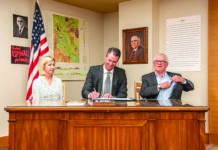The 2016 Presidential election has brought up an important ethical question: do politics have their place on college campuses, and if they do, where?
Presidential debates are frequently held on college campuses across the country. In the past few weeks they were held at Hofstra University, Longwood University, Washington University of St. Louis and University of Nevada, Las Vegas.
“Democracy’s messy,” CMU President Tim Foster said. “But it is our form of government and it’s important […] I think it’s good that we have students who are politically active, and then there becomes the issue of what role does the university and its resources play, and it has to be a neutral role.”
CMU offers clubs for politics: a political science club, a young democrats club and a young republicans clubs. Students have the right on campus to voice their opinion about a certain political party to some extent.
“If students want to sponsor somebody on campus and have them speak, okay,” Foster said. “Andyouhavecertainrightsand privileges to do that, but when somebody comes in and wants to use the instrumentality of the university, we can’t do that.”
Work for Progress, an independent group that campaigned for Hillary Clinton, came onto campus the first week of the fall semester. For weeks they advertised job openings to canvass around the Grand Junction area and encourage citizens to vote for Clinton.
“They’ve been very active, and you know their role is to push,” Foster said “And try to get their person [Clinton] elected, and we have to be smart enough to say you can’t do that. Or if you want to be on campus like any other third party vendor you need to pay whatever the fee is to be on campus.”
Work for Progress may have crossed the line of advertising when a representative spoke to a business class.
“The political science department does a nice job,” Foster said. “I don’t think they allow candidates to come in, certainly they’re gonna have elected officials come in who are one party or another, and I think they try to balance those conversations out. And that’s what you should do.”
On CMU’s campus it is free for students to have their own opinion, but in classrooms and throughout the university, it’s neutral.
“It’s the silly season,” Foster said. “That’s why I sent out an email and said ‘guys, be careful, realize we can’t do these things.’”



